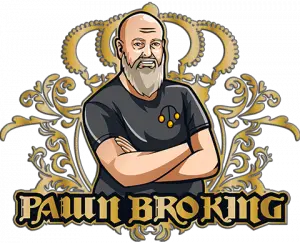When it comes to getting rid of valuable possessions, there are two main ways to do it: pawning or selling. Pawning is when you take an item to a pawn shop and receive money for it on the spot. Selling is when you find a buyer for your item and negotiate a price. Both have their pros and cons. This blog post will compare and contrast pawning vs. selling to help you make the best decision for your needs. So which one is better? Let’s have a look!
Pawning Pros:
- Pawnshops are everywhere, so it’s easy to find one near you.
- Pawnshops are open late, making them a convenient option for after-hours transactions.
- Pawnshops usually don’t require an appointment, so you can walk in and pawn your item whenever convenient.
- Pawnshops offer instant cash, so you don’t have to wait around for a buyer to be found.
- Pawning is a confidential process, so no one needs to know that you’re getting rid of your item.
- Payback the loan by paying a lower interest rate
- Get your collateral back from pawning it
- Save money on other loans and credit cards
- Avoid high-interest rates from other lending services
- Have a loan that’s guaranteed by the items you pawn.
- No need for collateral or complicated documents
- No negative impact on your credit score
Pawning Cons:
- Pawnshops charge interest on the money they lend, so you will end up paying more in the long run.
- Pawnshops usually don’t offer as much for an item as a seller would.
- The pawnshop can take your item away if you can’t pay back the loan plus interest.
- More Strict payment Schedules.
Selling Pros:
- You can get a better price for your item if you sell it yourself.
- You have more control over the selling process to negotiate a fair price with the buyer.
- There are many ways to sell an item to find the best option for you.
- Selling is a faster process than pawning.
- You don’t have to pay back a loan plus interest if you sell your item.
Selling Cons:
- Finding a buyer for an item can be more difficult than finding a pawn shop.
- Selling usually takes longer than pawning.
- You may have to lower your asking price to find a buyer.
So, what is the best option for you? Pawning or selling? It depends on your needs and what you’re looking for. If you need cash fast and don’t want to wait around for a buyer, pawning is the better option. If you want to get the best price for your item, selling is better. Pawning is confidential and easy to do, while selling can be more complicated but offers a higher payout. Ultimately, it’s up to you to decide which option is best for you.
What is pawning, and how does it work compared to selling a possession?
Pawning and selling are two popular ways to get rid of unwanted possessions. Pawning is a process where you temporarily give your possession to a pawnbroker in exchange for money. The pawnbroker will hold onto the item until you pay them back with interest. On the other hand, selling is when you give away your possession in exchange for money.
The benefits of pawning overselling
There are a few factors to consider when deciding whether to pawn or sell an item. Pawning offers more benefits than selling does. For one, you can get a higher price for your items when you sell them. Additionally, the process of selling takes longer than pawning. Pawnshops are typically willing to work with customers who need a little extra time to repay their loans, while sellers often have strict deadlines they must meet.
Pawning is confidential. No one needs to know that you’re getting rid of your belongings – unless you choose to tell them yourself. Selling is not as discreet; if someone sees your item being advertised online or in a store window, they might be able to figure out that it used to belong to you. Pawning is a great option if you need to quickly get rid of an item and don’t want anyone to know about it.
When it comes down to it, pawning vs. selling is a question of what’s more important to you: getting the best price for your items or keeping your transactions confidential? If price is your top priority, then selling is the better option. But if privacy is more important, then pawning is the way to go.
How to get the most money for your possessions when pawning them?
Pawning your possessions can be a great way to get some quick cash, but it’s not always the best option. Here are a few tips on how to get the most money for your belongings when pawning them:
- Be realistic about the value of your items. Pawnbrokers will offer you a fraction of your item worth, so don’t expect to get retail price.
- Know what you’re pawning. Pawnbrokers aren’t interested in used jewelry or appliances – they’re looking for high-value items that they can sell quickly.
- Clean and polish your items before you bring them in. A little elbow grease can go a long way in increasing the odds of getting a good deal on your pawned items.
- Be prepared to haggle. Pawnbrokers are always willing to negotiate, so don’t be afraid to ask for a better price.
If you’re unsure whether pawning or selling is the best option for you, contact your local pawnshop and speak with one of their experts. They can help you figure out the best way to get the most money for your possessions.
What to do if you don’t want to or can’t retrieve your pawned possessions?
When it comes to pawning vs. selling, what is better? Pawning generally offers a higher payout than selling an item outright but considers some things before deciding which option is best for you.
If you don’t want or can’t retrieve your pawned possessions, the pawnshop may help. Many shops have arrangements with buyers who will purchase entire inventories of items from the shop. It can provide a convenient way for the seller to get rid of unwanted items and receive some cash in return. However, it’s important to remember that these arrangements are not always available, so it’s always a good idea to check with your local pawn shop first.
When is it better to sell instead of a Pawn?
A few factors come into play when deciding if selling or pawning is the right choice. Pawning offers a quicker turnaround time, but selling may offer more money depending on the item. It’s important to consider all the variables before making a decision. For example, pawning might be better if you need cash quickly. However, if you’re not in a hurry and want to get the most money for your item, selling would be the best bet. Keep these things in mind when trying to decide between pawning and selling:
- How much do I need versus how much can I get?
Pawning usually offers a quicker turnaround time, but selling may offer more money depending on the item.
- How quickly do I need the money?
Pawning is often faster than selling, especially if you’re dealing with potential buyers.
- What are my other options?
If you need cash right away, pawning might be your only option. However, there are other ways to get money, such as borrowing from friends or family or taking out a loan.
- What is the item worth to me?
Pawning and selling both have benefits and drawbacks depending on how much you value your item.
- Is it worth more to someone else?
There’s always a chance that someone will pay more for an item than you would get by pawning or selling it.
- How easy is it to pawn/sell this item?
Pawning can be as quick as filling out a form and dropping off your item, while selling may require meeting with potential buyers or posting an ad.
Weigh all of these factors before making a decision. Pawning vs. selling: what’s best for you will depend on your specific situation? Contact us if you have any questions!
Final Thoughts
In the end, it’s up to you to decide what’s best for you. If you need money quickly, pawning might be the way to go. If you’re looking for the best possible deal, selling might be the better option. Either way is sure to research your options. Pawning is quick and easy while selling through a consignment store takes more effort but may pay off in the long run. Choose what works best for you and your needs.
Pawning vs. Selling: What is Better? Pawning is a process where you temporarily give your possession to a pawnbroker in exchange for money. The pawnbroker will hold onto the item until you pay them back with interest. Selling is when you give away your possession in exchange for money. For more information on how pawning works, visit our website or contact us today, and we would be happy to help! Thanks for reading!

Thomas Boseman is the author of Pawnbroking.com. A pawn shop owner by day, blog writer by night. When not writing, he enjoys exploring the outdoors with his dog, Roman. Thomas received his bachelor of arts in film from the University of Arizona. A Brooklyn native, Thomas is a lover of filmmaking, motorcycle, and coffee.
